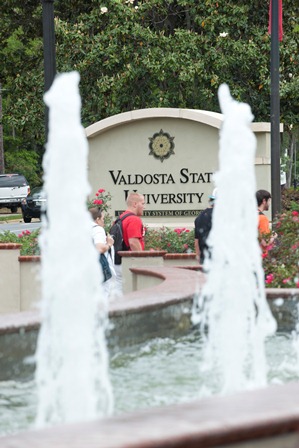Valdosta State Continues to be a Strong Economic Force
September 9, 2012
12-233
Valdosta State Continues to be a Strong Economic Force

|
VALDOSTA -- Valdosta State University continues to be a major
economic contributor for the Valdosta Metropolitan Statistical Area
(MSA), with more than $451.2 million generated through direct
spending and the multiplier effect in 2010-11.The Valdosta MSA
includes Lowndes, Brooks, Echols, and Lanier counties.
The study, conducted by the Center for Business and Economic
Research (CBER), calculated the economic impact of the university’s
expenditures, including capital projects, and student spending
during the 2010-11 academic year.
The study shows that VSU generated 5,055 jobs (direct and
indirect), creating an annual labor income impact of $208.7 million
for the Valdosta MSA.
Approximately $109.4 million was attributed to local expenditures
and represented the direct economic impact from ongoing economic
activities of the university. Included in these expenditures were
faculty and staff salaries (excluding benefits) earned by 1,302
fulltime and 526 part-time employees. VSU currently ranks within
the top 10 employers for the Valdosta MSA.
“The CBER study confirms that Valdosta State University continues
to fulfill not only its educational, but also its economic mission
for the people of South Georgia,” said VSU President William J.
McKinney. “This kind of economic impact further demonstrates that
higher education, and VSU in particular, is not simply a cost but
rather, an investment. We take this responsibility seriously, and
will work to continually improve the return on that investment.
“
Dr. Cindy R. Tori, professor of economics, in VSU’s Langdale
College of Business Administration, states that more than 9 percent
of the gross regional product and approximately one out of every 10
jobs in the Valdosta MSA are directly or indirectly influenced by
the university’s economic activities.
During 2010-11, direct expenditures from capital projects reached
more than $12.6 million. Included were renovations to Nevins Hall,
Odum Library, Mass Media Building (former Bookstore), and
construction of the Jerry and Kay Jennett Lecture Hall.
Tori estimates the university’s economic impact will continue to
rise significantly with the future construction of the Health
Sciences and Business Administration Building. Construction on the
140,000-square-foot building will begin later this month, and have
an overall economic impact of more than $56 million with an
estimated 1,190 jobs created throughout the construction
period.
As VSU continues to attract more students, especially from outside
the Valdosta MSA, the economic benefits continue to increase.
During the 2010-11 academic year the estimated average expenditure
per student was $6,380 for fall and spring semesters, and $3,816
per student during the summer. Based on student enrollment during
all three semesters, the estimated direct economic impact for
ongoing student expenditures was $181.5 million.
Tori, who contributes to the South Georgia Business Outlook, a
quarterly publication produced by the CBER that reports the
economic condition and events which influences businesses in South
Georgia, says that even during the nation’s slow economic recovery,
VSU has remained a strong economic supplier for the Valdosta
MSA.
“Since Valdosta received MSA status in 2003, the diversity of
businesses has expanded leading to a larger multiplier associated
with all economic activities,” Tori said. “Even though we have gone
through a recession, economic activity has improved in our
community and VSU has played a large part of this growth.”
Tori explains that the overall average multiplier for 2010-11 was
1.49; therefore, for every dollar of initial direct spending, an
additional 49 cents of spending was generated within the Valdosta
MSA. When local businesses and workers received payment from
university-related local spending, they then spent a portion of
their funds within the Valdosta MSA. The subsequent spending
reflects the multiplier effect.
“I was surprised that the multipliers here locally have improved so
much given the recent recession,” Tori said. “This is attributed to
the visibility associated with a MSA designation and the labor
market structure of our area. Having a really strong university in
your community is a stabilizing force. The businesses that would
normally fall by the wayside during an economic downturn are
supported by VSU’s economic activities, especially student
spending.”
Newsroom
- Office of Communications Powell Hall West, Suite 1120
-
Mailing Address
1500 N. Patterson St.
Valdosta, GA 31698 - General VSU Information
- Phone: 229.333.5800
- Office of Communications
- Phone: 229.333.2163
- Phone: 229.333.5983